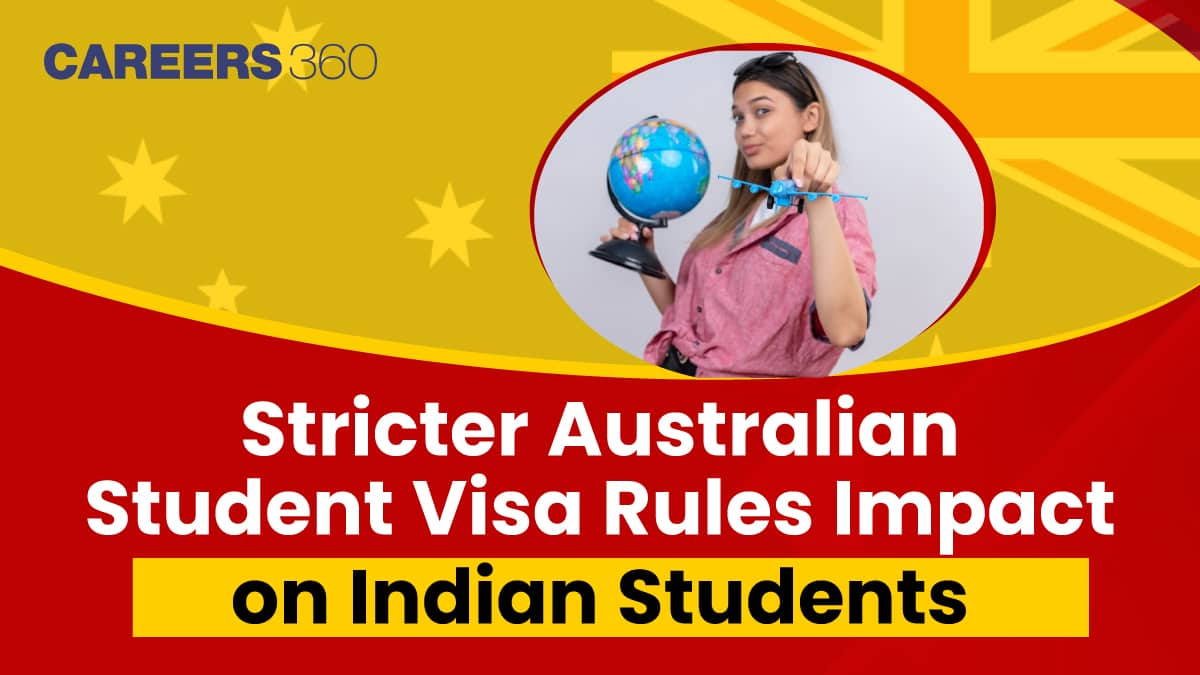Australia's Strict Student Visa Policies may impact the number of Indian Students going to Australia in 2025
Amid recent changes in Australian student visa policies for international students, this shift potentially has resulted in a decrease in the number of Indian students choosing Australia as a study abroad destination in 2025. More stricter study visa rules have negatively impacted the number of Indian students as these immigration rules could pose challenges such as scrutiny in visa processing and tightened documentation requirements. In 2025, Australian university enrollments are most likely to decline due to this significant development.
This Story also Contains
- Key Changes in Australian Student Visa Policies 2025
- Decline of Number of Indian Students Due to Strict Australian Study Visa Rules 2025
- Conclusion

Key Changes by Australian immigration authorities such as a potential cap on international students are making Australia an undesirable destination for education abroad. For a long time, Australia has been among the top 5 countries to study abroad for Indian students offering a top educational system and high research facilities to international students. However, the new stricter student visa rules 2025 are likely to impact the number of Indian students choosing Australia for higher education abroad.
Also Read:
Key Changes in Australian Student Visa Policies 2025
A few of the key study visa reforms in Australia include the following:
Mandatory CoE Requirements: Effective from 01 January 2025, a letter of offer is replaced by a confirmation of enrollment as per new study visa changes in Australia.
New Australia Study Visa Cap: Australian immigration authorities will cap the international student enrollments at 2,70,000. This new study visa cap for international students in Australia will decrease the number of students choosing Australia as a higher education abroad destination.
Strict Study Visa Financial Requirements: International students must demonstrate financial capacity through documents including at least AUD 29,710 as the minimum required funds.
Higher English Proficiency Requirements for Australia: Effective from March 2024, Australian immigration has increased the English proficiency level for international students.
New Australia Student Visa English Proficiency Requirements 2025
Australian Visa Type | Previous IELTS Requirements | New IELTS Requirements |
Student Visa | 5.5 | 6 |
ELICOS Studies (Pre-course) | 4.5 | 5.5 |
Foundation/Pathway courses | 5 | 5.5 |
Temporary Gradute Visa | 6 | 6.5 |
Related Reads:
Decline of Number of Indian Students Due to Strict Australian Study Visa Rules 2025
In 2024, there were approximately 1,18,109 Indian students who chose to study in Australia. Seeing the popularity of Australia as a popular study abroad destination, Australian immigration has introduced significant changes in the the student visa policies for 2025. With the potential international student cap at 2,70,000 in 2025 by Australian immigration authorities limiting the number of international student enrollments in universities and colleges. The study visa cap has not been implemented yet; however, international students feel that there are challenges amid these stricter and stricter scrutiny policies.
Conclusion
Australian immigration has imposed stricter student visa policies and rules in order to address migration and immigration fraud while maintaining high educational standards. However, there has been a decline in the number of Indian students choosing to study in Australia in 2025 due to these rigid policies.
Related Links: Australian New Study Visa Rules 2025
Frequently Asked Questions (FAQs)
The success rate of Australian student visa for international students in 2025 is generally 85 to 90%. Students must consider new rules and regulations for study permits before applying.
The study visa in Australia for 2025 are getting rejected nowadays due to increased scrutiny and stricter visa policies introduced by immigration authorities.
While it is not implimented yet, it has been said that Australian immigration will cap the number of international students coming to Australia at 2,70,000.
As per the new rules in Australian student visa 2025, international students are required to submit stricter financial documents, higher English proficiency, and go through stricter study visa policies.
Questions related to
On Question asked by student community
The University of Technology Admission and Application Process
Go through the url - https://studyabroad.careers360.com/australia/universities/university-of-technology-sydney-unpg
Bihar Board exams for Class 10 and Class 12 are usually held every year in February. For example, the Class 10 exams in 2026 are scheduled from 17 February to 25 February, and the Class 12 exams are from 2 February to 13 February according to the official Bihar School
Hello Anjali
The Duolingo English Test (DTE) is conducted to measure your English Skills(Reading, Writing, Listening and Speaking) through a computer adaptive format. It's easier or harder based on performance, and the sample section includes a video interview and a writing task to measure writing and speaking fluency.
Yes, some
Hello Aspirant,
SP Jain’s BBA has a reputation for global exposure because students rotate between campuses located in Dubai, Singapore, and Sydney. The campuses are high-quality, and the peer group is diverse -- bringing together students from numerous countries which helps develop a vibrant and competitive crowd. The study abroad
Hello ,
As per current trend , The processing time is of 30-56 days that is 1 to 8 weeks , it is faster if your university is under 80% international cap , priority 1 , slower if over 80%
TIPS TO HELP FOR QUICKER PROCESSING
1. Submit a complete
Applications for Admissions are open.
Apply for UG & PG programs from Victoria University, Delhi NCR Campus
Study in Ireland
ApplyWant to study in Ireland? Explore Universities & Courses
Study in Canada
ApplyExplore Universities, Courses & Subjects | Work while study
Study in UK
ApplyApply for upcoming intake & plan your journey
Study in USA
ApplyUniversities inviting applications | Get expert guidance
Study in Australia
ApplyShortlist best ranked universities & get expert guidance